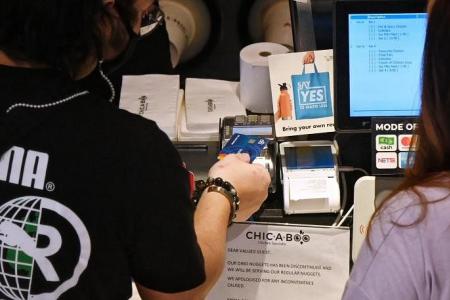High credit card debt in Singapore not a concern yet
Despite rising inflation and slower growth in 2022, cardholders continued to splurge on discretionary purchases such as bubble tea, online gaming and travel, bank data showed.
Official data from the Department of Statistics also revealed a jump in credit card debt levels throughout the year to its highest since before the pandemic, although industry insiders said this appears to be under control for now.
Data from UOB Bank, which was based on spending patterns and transaction volumes on its credit and debit cards between January and November this year, showed that cardholders spent the most on bubble tea compared with other beverages. For example, the total amount spent on bubble tea was almost triple that of coconut shakes, which is also a popular beverage among consumers.
UOB’s head of group personal financial services Ms Jacquelyn Tan, said that every hour, UOB customers drank about 100 cups of bubble tea compared with 38 cups of coconut shakes in the same period. That works out to approximately 1.7 cups of bubble tea per minute, UOB added.
The bank declined to provide absolute figures on transactions and volumes and spending figures.
The other high spend category was online gaming, where the amount spent grew by almost 25 per cent from January to November. The average spend per transaction rose 17 per cent during the period compared with the same period in 2021, UOB said.
Communications manager Kelly Chiew, 29, is one of those who spends quite a bit on bubble tea and gaming.
Ms Chiew told The Straits Times that she spends around $50 or more every month on bubble tea. She also purchased a Sony PlayStation 5 and new games for the console recently.
Ms Chiew, who is expecting her first child soon, said the additional spending takes her monthly expenses up to $1,800 per month on average.
Another big spending category for cardholders is travel - South Korea was the top destination for UOB customers, followed by Australia and Japan, said UOB’s Ms Tan.
Trust Bank Singapore, a digital banking venture between Standard Chartered and FairPrice Group which launched on Sept 1, is seeing a similar trend. The bank said its customers travelled to 102 countries, with Malaysia being the most popular destination and Argentina being the farthest from home.
Indeed, Singaporeans were bitten by the travel bug after being confined at home for two years.
As borders reopened, some like business owner Mr Tay, 37, travelled round the world with his family, from Bangkok and Perth and to Norway and Switzerland. Mr Tay has already planned and budgeted for the family’s holidays to South Korea and Japan in March and December 2023.
Lab technician Mr Goh, 31, also spent quite a bit on a trip to South Korea this year with his wife and daughter.
Marketing manager Mr Ang Jian Hui, 37, travelled too, but to nearby locations. The family went to Bintan and back to the Philippines to visit his wife’s family.
But as discretionary spending picked up with the reopening of the economy in 2022, data compiled by the Department of Statistics showed that households accumulated more credit card debts in the third quarter of this year. Card debts rose 12.3 per cent from the first quarter to $12.1 billion in the third quarter.
The level of credit card debt is the highest since the fourth quarter of 2019, when it reached $12.6 billion.
The situation is not a concern if people pay off their bills in full every month to avoid incurring and accumulating high interest charges on the outstanding amount as well as late payment fees.
Credit card interest charges are among the highest in the banking industry, with all three local banks charging more than 26 per cent a year in late payment interest.
Ms Tan Huey Min, general manager of Credit Counselling Singapore, said credit card debt becomes a problem when people roll over their bills, or pay only a portion of their credit card bills. A high interest rate is incurred on the remaining amount that is not paid, she added.
“If a cardholder continues to make more purchases with his credit card and only pays off part of his bill every month, his outstanding credit card debt will grow”, Ms Tan said.
“If you pay off in full and in time when the bill comes, you can still have fun. Enjoy yourself a little bit”, she added.
For now, Ms Tan said things appear to be under control, with the number of first-time borrowers looking for help with their credit card problems down 14 per cent from last year.
With a recession looming though, those whom ST spoke to said they will cut back on discretionary spending in 2023 if needed.
For Ms Chiew, that will mean less bubble tea and gaming, while Mr Tay said he would consider cutting all holiday trips in 2024 if he is hit hard by a recession in 2023. Mr Tay added he will focus more on increasing his income streams because “there is a limit to how much you can cut expenses, but no limit for you to increase income”.
But Mr Ang said he is not going to lose sleep over a recession, which is beyond his control. “I will see where I can cut spending and probably sell the car to save some money,” he said.
Get The New Paper on your phone with the free TNP app. Download from the Apple App Store or Google Play Store now


